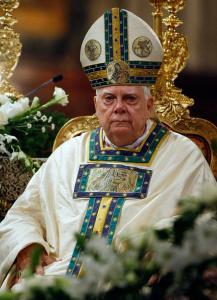By Mark Arsenault
Boston Globe
November 22, 2011
http://www.boston.com/news/local/massachusetts/articles/2011/11/22/cardinal_bernard_law_retires_from_post_in_rome/
 |
| It is possible that Cardinal Law will not return. |
Cardinal Bernard F. Law, the former Boston archbishop, has retired from his post in Rome as archpriest of the Basilica of St. Mary Major, ending a 50-year career indelibly stained by the perception he covered up the crimes of pedophile priests.
Advocates for clergy sexual abuse victims welcomed Law's departure.
"It's a long time coming, but we are certainly glad his influence is finally, for all intents and purposes, over in Rome," said Terry McKiernan, founder of bishopaccountability.org, a library and Internet archive of the clergy abuse scandal.
The Vatican obliquely noted Law's departure, announcing in a statement that Pope Benedict XVI had named Archbishop Santos Abril y Castello of Spain as the basilica's new archpriest without mentioning that Law was stepping down.
Law resigned as Boston archbishop in 2002 amid growing criticism over his handling of child sexual abuse cases. Advocates for victims were outraged in 2004 when Pope John Paul II gave Law his highly visible post at the basilica. Nearly 10 years after his resignation in Boston, Law's name still sparks intense criticism; child advocates were infuriated earlier this month over reports of an 80th birthday party planned for him in Rome.
Some victims of clergy sexual abuse were skeptical that Law's retirement as archpriest means he is giving up all his influence in the church.
Robert Costello, 50, of Norwood, said Law has been serving in several influential departments of the Vatican.
"He's just resigning one position in the company; he's still with the company," said Costello, who was sexually abused in West Roxbury in the 1960s and 70s by the late Rev. John M. Cotter.
Rocco Palmo, who covers church news and politics online, first reported Law's move. He said Law was leaving his sinecure at a younger age than other recent holders of the seat and that the Vatican may be reacting to critics who have said Law's appointment was a sign that the church did not "get it" when it came to clergy sexual abuse.
"I think they're sending a signal that it had become a liability," said Palmo, a former US correspondent for the London-based international Catholic weekly The Tablet. "I think it's an acknowledgment, albeit more belated than a lot of folks would want, that that was not helping in terms of perception."
But John L. Allen, a senior correspondent for the National Catholic Reporter, cautioned against reading too much into Law's abrupt retirement, noting Law's recent birthday.
"A cardinal at 80 technically starts powering down," said Allen, speaking by phone from Rome yesterday.
As he turns 80, a cardinal loses his right to vote for the next pope and typically is not reappointed as his terms expire at the various Vatican departments he serves, Allen said. "If the Vatican wanted to rebuke Law, there would certainly have been more direct ways."
A spokesman for the Boston Archdiocese referred all questions on Law to the Vatican. A man who answered the phone at the Vatican press office declined to comment, suggesting a reporter call back today.
Law, who was born in Mexico, was ordained in 1961 and became archbishop of Boston in 1984. He was elevated to cardinal the next year.
Raymond L. Flynn, former Boston mayor and US ambassador to the Vatican, gave Law credit for promoting racial healing in Boston upon his appointment as archbishop.
"In 1984, Boston was a divided and polarized city," Flynn said by e-mail. "That was the city's greatest challenge at the time. Nothing else would work, if we didn't change the direction that Boston had been headed since court-ordered school busing in 1974.
"Religious leaders - Protestant, Jewish, and Catholic, led by Cardinal Law - came together at City Hall and pledged their unqualified support for racial, social, and economic justice," said Flynn.
In the 1980s and early 1990s, Law and Cardinal John O'Connor of New York were the most influential Roman Catholic leaders in the United States, Flynn said.
Law became known for his international diplomacy and was prominent in strengthening relations between the Vatican and Vietnam, which has one of the largest Catholic populations in Asia, said Palmo.
Law's greatest diplomatic triumph may be paving the way for John Paul II's 1998 visit to Cuba. That trip "was massive in terms of its importance, not just for Cuba itself but for the church in the entire American hemisphere," Palmo said. "It showed an emergence for the church again, after a long difficult relationship over the decades after the Cuban revolution."
But it is the sexual abuse scandal that rocked the church 10 years ago that dominates Law's legacy.
"For the American market, it's impossible to talk about his legacy outside of the abuse scandal," said Allen. "It's like asking about Richard Nixon's legacy outside of Watergate."
In Rome, the perception of Law is much more nuanced, he said. "Over here, the perspective always was, 'Yeah, he screwed up on the crisis, but there's a lot else to talk about,' " said Allen. "They would look at his role defending the prolife teachings of the church. They would look at his role promoting solidarity between the church in the United States and Latin America.
"In Rome, the view of Law was that he was a loyal servant of the church who tried to bring a global perspective to the church in the United States, who also was identified with a very dark chapter."
Specialists who study the church doubt that Law would return to live in the United States; it is commonly believed that he will live out his retirement in Rome.
Contact: marsenault@globe.com
Any original material on these pages is copyright © BishopAccountability.org 2004. Reproduce freely with attribution.